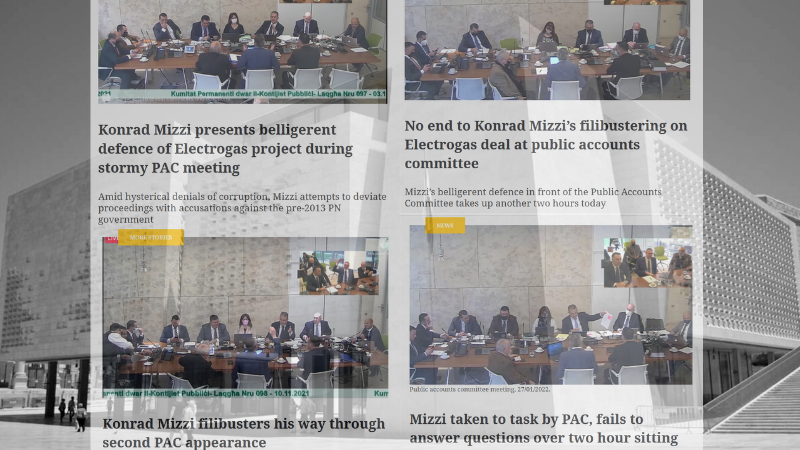The Public Accounts Committee (PAC) was created to audit how public money is spent and assess whether decisions about how to use that money were taken in the public’s interest, but it has been struggling to carry out this process in relation to the Electrogas deal for the last two years.
One of the PAC’s major points of inquiry over the past two legislatures has been a damning investigation into Electrogas by the National Audit Office (NAO).
The report highlighted “various shortcomings” and described major, often undocumented, flaws in the selection and evaluation process.
The NAO report also revealed that taxpayers were overcharged by millions of euros, with the Auditor General expressing “serious reservations” about an “irregular” and “unprecedented” €360 million loan guarantee given to Electrogas by the government.
The PAC has been bogged down with its hearings on the Electrogas deal for nearly two years despite having access to this comprehensive 600-page NAO report.
Step one: delay
Disgraced former energy minister Konrad Mizzi’s signature was all over the Electrogas deal. He took up eight hours of the PAC’s time alone, six of which were spent on an inane presentation that cherry-picked quotes from the NAO report and attempted to pass the project off as an investment that benefited the Maltese public.
Mizzi’s appearances were spread over four sittings held between November 2021 and February 2022. He missed three sittings, which had to be rescheduled, due to a sudden case of peritonitis and being unavailable because his lawyers were busy. Over four months of hearings were spent on just this one witness.
In the current legislature, Labour MPs on the PAC are insisting on holding parallel hearings in alternating weeks.
Rather than focusing on one report at a time, a process which was already slow, the PAC has decided to spend one week on the Electrogas investigation and the other discussing a report about the government’s efforts to implement United Nations sustainability goals.
The two sittings that have been held so far have consisted of one in which MPs on the PAC fielded questions to the author of the NAO report on the government’s efforts to implement the goal to ‘end all poverty’, and another where government permanent secretaries whose remit relates to efforts to curb poverty were interviewed.
Step two: deny
Following his time-consuming presentation, Mizzi took up more hours of the committee’s time baiting Opposition MPs into long, pointless arguments, denying any wrongdoing and countering with constant accusations of partisan motives behind their line of questioning.
Other witnesses followed his example. During a more recent sitting held on 28 June, the former chair of Enemalta’s board of directors, ex-Labour MP and notary Charles Mangion, denied all responsibility for approving the deal, arguing that Electrogas was “a fait accompli” by the time the board had to make its decision.
Step three: defend
When all else fails, Labour MPs on the PAC intervene to defend projects the government has carried out. Much of this time is wasted with partisan jibes, especially in the case of a two-year investigation into one of the biggest public-private partnerships the government has ever embarked upon.
The discussion on the NAO report has also been bogged down with unprecedented procedural changes. In addition to this new ‘parallel hearing’ system, government MPs also strong-armed the committee into adopting a process through which witnesses called in to testify must first be approved.
One glaring example of how easily this could become an issue that hinders the committee’s work was exposed when Opposition MPs did not manage to secure approval for their request to call police commissioner Angelo Gafa’ to testify about what actions if any have been taken by the police in relation to issues exposed by the NAO’s report.
The first parliamentary committees were established in the 1990s to delegate parliamentary functions, improve efficiency and increase the amount of time allocated to discussions and decision making.
Unfortunately, they have become another partisan battleground where political games take precedence over the public good, and where accountability is in even shorter supply than dignified parliamentary behaviour.














Il-korruzzjoni kollha se ttir mar-rih. L-aqwa li hrigna mill-lista l-griza u issa nistghu nergghu nisimghu bl-iskandli u xejn ma jwaqqafhom hlief – il-poplu BISS jista’ jaghmel xi haga.
It is time for the PN to boycot the PAC commissions. These have become a farce for good governance to be truly achieved.
They should use the media and Parliament to lay down specific questions to the Ministers concerned.
This will not solve much, but at least the public will know that the PN is serious in good governance.
Unfortunately many go into politics in Malta to serve their own good rather than that of the public. The OAC in the U.K. has teeth and even Boris Johnson would be deferential. There should be no partisan games in such a serious committee and anyone attempting to take political sides should be removed!
The Opposition has an opportunity to focus on the most significant corrupt deals, illicit practices, and bad decisions endorsed by this Gov to the detriment of taxpayers money before the presentation of the next budget. They should present a detailed analysis to the public for the understanding of everyone, explaining the effects that corruption leaves on our financial system and how we should have been better off without it. This is in the wake of the current excessive and unprcedented national debt and the unbalanced budgets to come. Il bużżieqa dalwaqt tinfaqa!